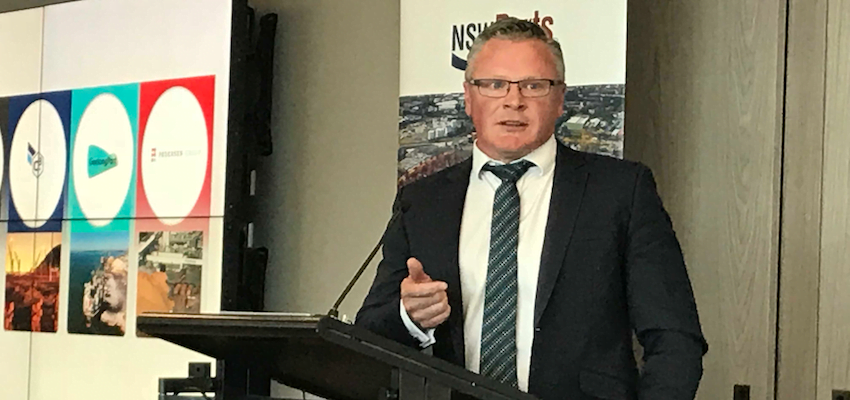GROUP chief executive of LINX Cargo Care Anthony Jones has talked of how data sharing and upskilling one’s workforce were crucial components in an interconnected supply chain.
His comments came as part of a networking event in Sydney, hosted by the Australian chapter of the International Cargo Handling Co-ordination Association.
ICHCA chair John Warda began proceedings by providing some background on the industry body which works on the global stage to represents the interests of logistics operators and counts most major ports among its members.
“Our role is dedicated to providing improved productivity, sustainability, safety and security of cargo handling and we cover all modes of transport… we have members right across the supply chain,” Mr Warda said.
“There is membership in 37 nations… we have our own expert technical panel of about 90 people in all sides of cargo handling and we provide technical advice through seminars, workshops, conferences and networking events.”
LINX Cargo Care is a diversified logistics infrastructure and solutions provider formed more than two years ago after the breakup of Asciano.
Anthony Jones talked of LINX being focussed on staying relevant.
“I think everyone in this room would know that relevance and just because you’re built off a hundred years of history, it doesn’t necessarily mean you’ll be here next year or the year after,” Mr Jones said.
He said that when the company formed it had to create all its back-of-house systems and resources from scratch.
“It took us about 18 months to do that… But we got the opportunity to re-set our future… so every system that we operated off, every IT system, we were able to transform and take us forward into what we wanted to look like in the future,” Mr Jones said.
“You hear a lot of people talk about data but the disaggregation of data and then the understanding of data was a real challenge for us in our business with the systems that we used to operate across.”
He said it was critical to be able to understand the “data flow” as freight volumes grew in Sydney and to comprehend how a doubling of container volumes would impact other parts of the supply chain.
“Becoming a critical partner at Enfield [intermodal terminal] and being able to evacuate freight via rail and give Sydneysiders a better quality of life but also supply their needs every day, is something that we wanted to be part of,” Mr Jones said.
“We strongly believe that rail intermodals, complementing the road infrastructure will actually liberate freight and actually make it a far more efficient operation for society not only in New South Wales but across Australia and New Zealand.”
Online platforms have revolutionised our shopping experience but have also created unprecedented complexity in the supply chain, according to Mr Jones.
“It creates challenges for society and they’re real challenges that are facing all of us.”
“At LINX we have a very clear view that sharing of data will actually influence supply chains and actually influence better outcomes for the whole industry,” he said.
One of the areas of focus for the LINX business is creating diversity and dealing with an ageing workforce. The company employs around 4000 people directly at 73 sites around Australia, and employs many more people indirectly.
“It’s beholden on us as leaders to actually take our people on a journey, to not just cast them away when we automate or we innovate but to actually take them on and give them new careers in the future, train up and skill up our people,” Mr Jones said.
“These emerging trends are facing everyone in the transport industry and I daresay these emerging trends are facing everybody in every industry,” he said.

